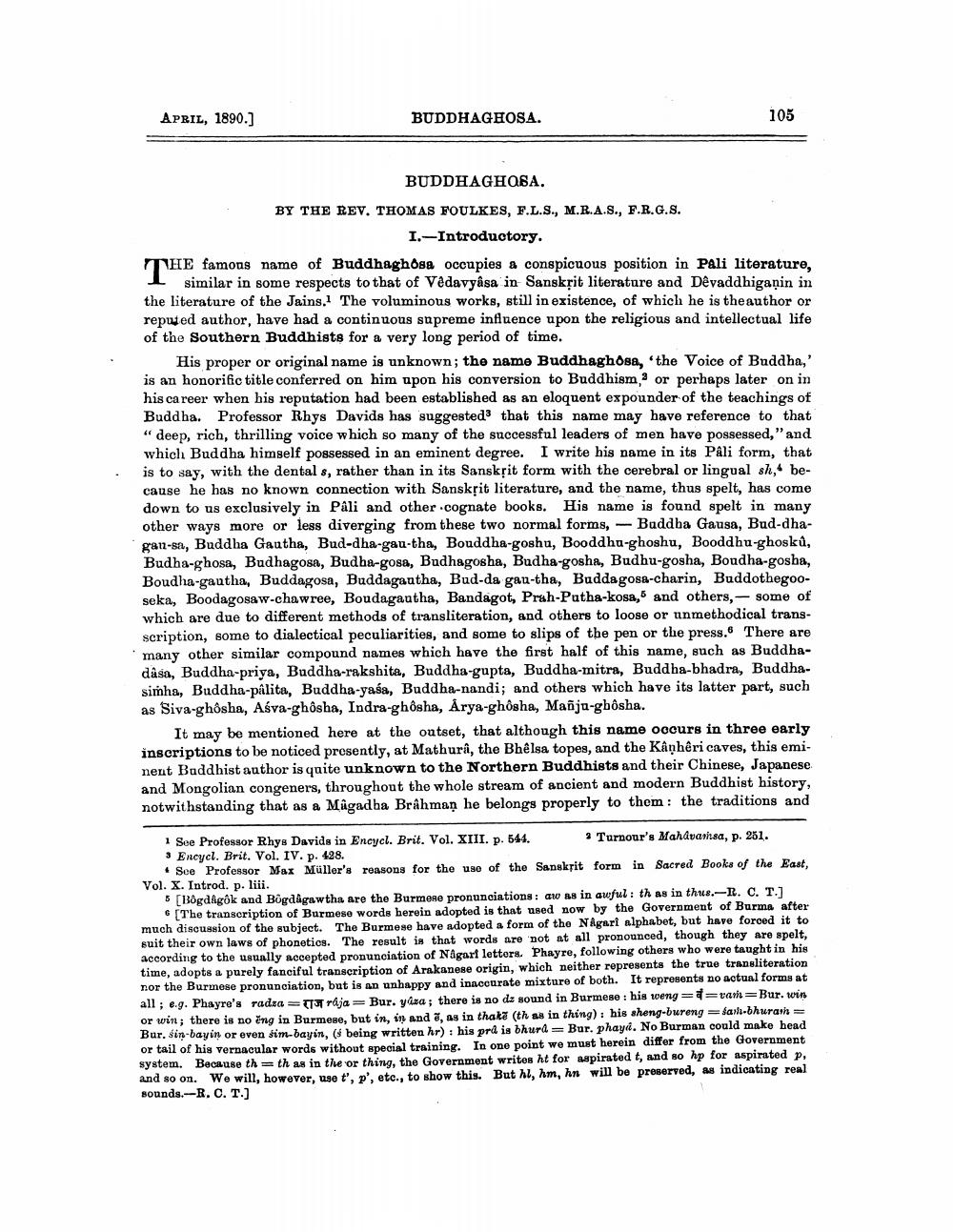________________
APRIL, 1890.)
BUDDHAGHOSA.
105
BUDDHAGHOBA. BY THE REV. THOMAS FOULKES, F.L.S., M.R.A.S., F.R.G.S.
I.-Introductory. THE famons name of Buddhaghosa occupies a conspicuous position in Pali literature,
1 similar in some respects to that of Vedavyâsa in Sanskrit literature and Dêvaddhigaộin in the literature of the Jains. The voluminous works, still in existence, of which he is the author or repued author, have had a continuous supreme influence upon the religious and intellectual life of the Southern Buddhists for a very long period of time.
His proper or original name is unknown; the name Buddhaghosa, 'the Voice of Buddha,' is an honorific title conferred on him upon his conversion to Buddhism, or perhaps later on in his career when his reputation had been established as an eloquent expounder of the teachings of Buddha. Professor Rhys Davids has suggested that this name may have reference to that “deep, rich, thrilling voice which so many of the successful leaders of men have possessed," and which Buddha himself possessed in an eminent degree. I write his name in its PAli form, that is to say, with the dental s, rather than in its Sanskrit form with the cerebral or lingual sh, because he has no known connection with Sanskrit literature, and the name, thus spelt, has come down to us exclusively in Pali and other.cognate books. His name is found spelt in many other ways more or less diverging from these two normal forms, Buddba Gausa, Bud-dhagan-sa, Buddha Gautha, Bud-dha-gau-tha, Bouddha-goshu, Booddhu-ghoshu, Booddhu-ghosků, Budha-ghosa, Budhagosa, Budha-gosa, Budhagosha, Budha-gosha, Budhu-gosha, Boudha-gosha, Boudha-gautha, Buddagosa, Buddagautha, Bud-da gau-tha, Budda gose-charin, Buddothegooseka, Boodagogaw.chawree, Boudagautha, Bandagot, Prah-Patha-kosa, and others, - some of which are due to different methods of transliteration, and others to loose or unmethodical transscription, some to dialectical peculiarities, and some to slips of the pen or the press. There are many other similar compound names which have the first half of this name, such as Buddhadåsa, Buddha-priya, Buddha-rakshita, Buddha-gupta, Buddha-mitra, Buddha-bhadra, Buddhasimha, Buddha-palita, Buddha-yasa, Buddha-nandi; and others which have its latter part, such as Siva-ghôsha, Aśva-ghôsha, Indra-ghôsha, Arya-ghôsha, Manju-gbôsha.
It may be mentioned here at the outset, that although this name occurs in three early inscriptions to be noticed presently, at Mathura, the Bhêlsa topes, and the Kanhêri caves, this eminent Buddhist author is quite unknown to the Northern Buddhists and their Chinese, Japanese and Mongolian congeners, throughout the whole stream of ancient and modern Buddhist history, notwithstanding that as a Magadha Brahman he belongs properly to them: the traditions and
1 See Professor Rhys Davids in Encycl. Brit. Vol. XIII. p. 544. Turnour's Mahavarisa, p. 281. 3 Encycl. Brit. Vol. IV. p. 428.
• Soe Professor Max Müller's reasons for the use of the Sanskrit form in Sacred Books of the East, Vol. X. Introd. p. liii.
5 [Bagdagôk and Bögdagawtha are the Burmese pronunciations : aw as in awful: th as in thus.-R. C. T.]
. [The transcription of Burmese words herein adopted is that used now by the Government of Burma after much discussion of the subject. The Burmese have adopted a form of the Nigari alphabet, but have forced it to suit their own laws of phonetics. The result is that words are not at all pronounced, though they are spelt, according to the usually accepted pronunciation of Nagart lettors. Phayro, following others who were taught in his time, adopts a purely fanciful transcription of Arakanese origin, which neither represents the true transliteration nor the Burmese pronunciation, but is an unhappy and inaccurate mixture of both. It represents no actual forms at all; e.g. Phayre's radiator raja Bur. yaxa; there is no ds sound in Burmese : his woeng = =van Bur.win or win, there is no ing in Burmese, but in, i and 7, as in thaka (th as in thing): his sheng-bureng lala-bhurath Bur, Sin-bayin or even sim-bayin, (1 being written hr): his pra is bhurd=Bur. phayli. No Burman could make head or tail of his vernacular words without special training. In one point we must herein differ from the Government system. Because th th as in the or thing, the Government writes ht for wapirated t, and so hp for aspirated P. and so on. We will, however, use t', p', etc., to show this. But hi, hm, hm will be preserved, as indicating real Bounds.-R.O.T.)




